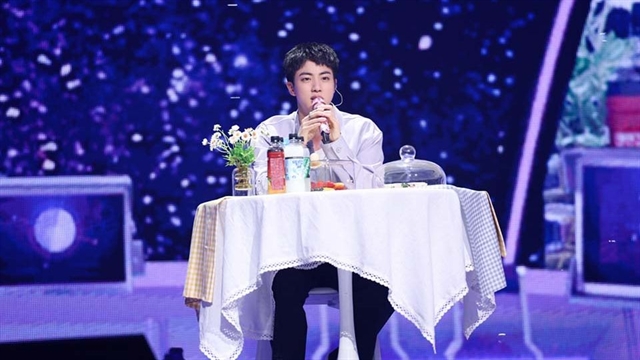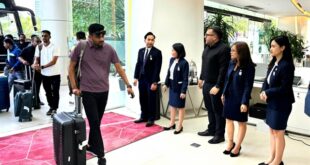SEOUL — The punishing schedule and little rest that K-pop stars endure are not new. Big-name K-pop agencies have been consistently criticised for operating like factories in producing and managing artists.
 |
| Jin speaks during a ‘mukbang’ session at his fan-meeting event held at Jamsil Arena, Seoul, June 13. Photo BIG HIT MUSIC/THE KOREA HERALD |
Bang Si-hyuk, chairman of Hybe, the largest K-pop agency globally, acknowledged this issue in a CNN interview in March 2023. “It’s not a total urban legend. Of course, there was some element of it in the past,” he said.
Bang suggested that the issue was a thing of the past and argued that today, K-pop companies “try their best not to violate the artists’ freedom”.
Yes, K-pop idols are no longer forced to work; but they are still expected to.
With the development of the internet and the ever-growing power of social media, K-pop stars now have the additional task of staying connected with fans around the clock.
Unlike earlier generations of K-pop singers who could rest between their intense schedules and call it a day upon returning home, today’s idols have to shoot short-form videos for Instagram and TikTok between performances and regularly engage with fans via livestreams.
During a June 30 livestream session with fans on Hybe’s global fandom platform Weverse, BTS’s Jin jokingly said that he had only had a day of rest since being discharged from the Army on June 12.
Since his discharge, Jin has been attending public events, recording sessions and promotional activities for the ongoing Olympic Games in Paris, not to mention his online fan engagements.
In June of last year, Jungkook of BTS famously fell asleep while communicating with fans online.
Only a month later, Baekhyun of EXO worried fans when he fell asleep for an hour while talking to them on Space, a live audio conversation platform on X (formerly Twitter).
“Live streaming services have helped idols stay more connected with fans. Some are utilizing the service for their benefit, which is a positive aspect of the internet,” a local entertainment company official said Monday.
While some K-pop singers may be willing to sacrifice their personal lives for their fans, many feel pressured to emulate the efforts of Jungkook or Zico, another K-pop singer known for his short-form videos on social media.
Zico apologised to other K-pop singers on a YouTube show in March for unwittingly pressuring them to participate in the dance challenge trend, which has since become “mandatory” for K-pop bands.
“I genuinely have nothing to say in my defence. I feel deeply apologetic. Perhaps, taking this opportunity, all entertainment agencies and platforms in the Korean entertainment industry should consider collaborating and taking a one-month break (for K-pop idols),” Zico said on the March 7 episode of the YouTube channel Careet.
Professor Lee Jong-im of Seoul National University of Science & Technology blamed K-pop agencies for creating a demanding work environment with fandom platforms like Bubble and Weverse.
“The commercialisation of platforms like Weverse and Bubble, now managed by the agencies, is increasing the workload for idols due to the demands of social media engagement,” the professor said.
“In the case of BTS, the members’ communication efforts with fans on YouTube and Twitter played a crucial role in making them global stars. Following this success, Hybe launched the fandom platform Weverse (in 2019), and SM Entertainment introduced Bubble (a year later),” Lee said.
Agencies manage fan data and gather information through these platforms, Lee pointed out, which, in turn, requires idols to provide more personal content, meaning longer work hours.
Lee also highlighted the difficulty in distinguishing whether K-pop stars’ activities on social media are work or pleasure.
“Sharing their daily lives with fans to build a sense of closeness blurs the line between work and leisure for the idols. This constant interaction raises questions about whether it’s part of their job or just a hobby,” the professor said. — THE KOREAN HEARLD/ANN
- Reduce Hair Loss with PURA D’OR Gold Label Shampoo
- Castor Oil Has Made a “Huge” Difference With Hair and Brow Growth
- Excessive hair loss in men: Signs of illness that cannot be subjective
- Dịch Vụ SEO Website ở Los Angeles, CA: đưa trang web doanh nghiệp bạn lên top Google
- Nails Salon Sierra Madre
 VnExpress News The News Gateway of Vietnam
VnExpress News The News Gateway of Vietnam





